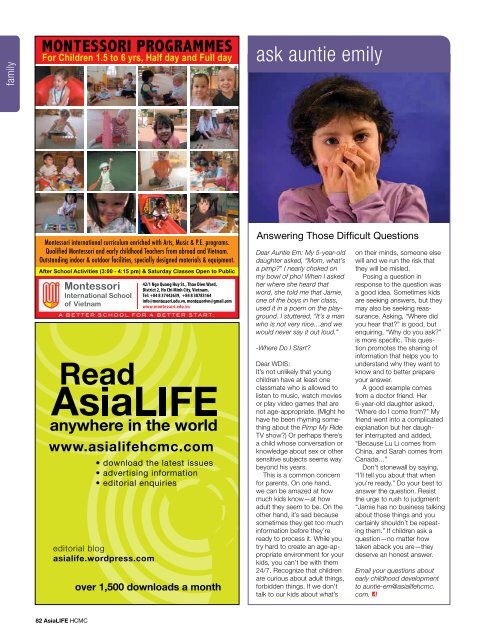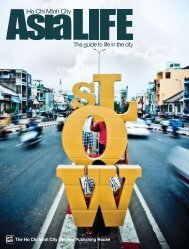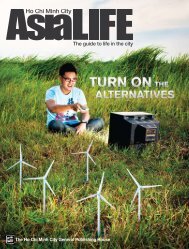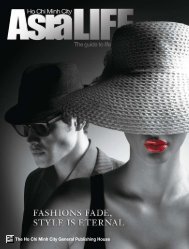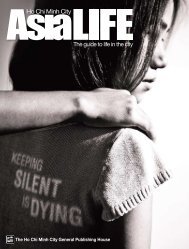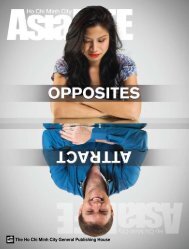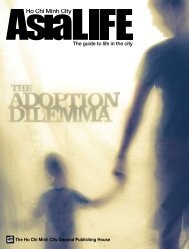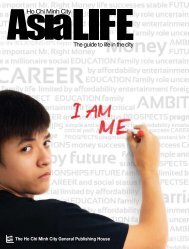Nam Ky Khoi Nghia - Asialife HCMC
Nam Ky Khoi Nghia - Asialife HCMC
Nam Ky Khoi Nghia - Asialife HCMC
Create successful ePaper yourself
Turn your PDF publications into a flip-book with our unique Google optimized e-Paper software.
• download the latest issues<br />
• advertising information<br />
• editorial enquiries<br />
editorial blog<br />
asialife.wordpress.com.<br />
over 1,500 downloads a month<br />
ask auntie emily<br />
Answering Those Difficult Questions<br />
Dear Auntie Em: My 5-year-old<br />
daughter asked, “Mom, what’s<br />
a pimp?” I nearly choked on<br />
my bowl of pho! When I asked<br />
her where she heard that<br />
word, she told me that Jamie,<br />
one of the boys in her class,<br />
used it in a poem on the playground.<br />
I stuttered, “It’s a man<br />
who is not very nice…and we<br />
would never say it out loud.”<br />
-Where Do I Start?<br />
Dear WDIS:<br />
It’s not unlikely that young<br />
children have at least one<br />
classmate who is allowed to<br />
listen to music, watch movies<br />
or play video games that are<br />
not age-appropriate. (Might he<br />
have he been rhyming something<br />
about the Pimp My Ride<br />
TV show?) Or perhaps there’s<br />
a child whose conversation or<br />
knowledge about sex or other<br />
sensitive subjects seems way<br />
beyond his years.<br />
This is a common concern<br />
for parents. On one hand,<br />
we can be amazed at how<br />
much kids know—at how<br />
adult they seem to be. On the<br />
other hand, it’s sad because<br />
sometimes they get too much<br />
information before they’re<br />
ready to process it. While you<br />
try hard to create an age-appropriate<br />
environment for your<br />
kids, you can’t be with them<br />
24/7. Recognize that children<br />
are curious about adult things,<br />
forbidden things. If we don’t<br />
talk to our kids about what’s<br />
on their minds, someone else<br />
will and we run the risk that<br />
they will be misled.<br />
Posing a question in<br />
response to the question was<br />
a good idea. Sometimes kids<br />
are seeking answers, but they<br />
may also be seeking reassurance.<br />
Asking, “Where did<br />
you hear that?” is good, but<br />
enquiring, “Why do you ask?”<br />
is more specific. This question<br />
promotes the sharing of<br />
information that helps you to<br />
understand why they want to<br />
know and to better prepare<br />
your answer.<br />
A good example comes<br />
from a doctor friend. Her<br />
6-year-old daughter asked,<br />
“Where do I come from?” My<br />
friend went into a complicated<br />
explanation but her daughter<br />
interrupted and added,<br />
“Because Lu Li comes from<br />
China, and Sarah comes from<br />
Canada…”<br />
Don’t stonewall by saying,<br />
“I’ll tell you about that when<br />
you’re ready.” Do your best to<br />
answer the question. Resist<br />
the urge to rush to judgment:<br />
“Jamie has no business talking<br />
about those things and you<br />
certainly shouldn’t be repeating<br />
them.” If children ask a<br />
question—no matter how<br />
taken aback you are—they<br />
deserve an honest answer.<br />
Email your questions about<br />
early childhood development<br />
to auntie-em@asialifehcmc.<br />
com.<br />
82 asialife <strong>HCMC</strong> asialife <strong>HCMC</strong> 83


